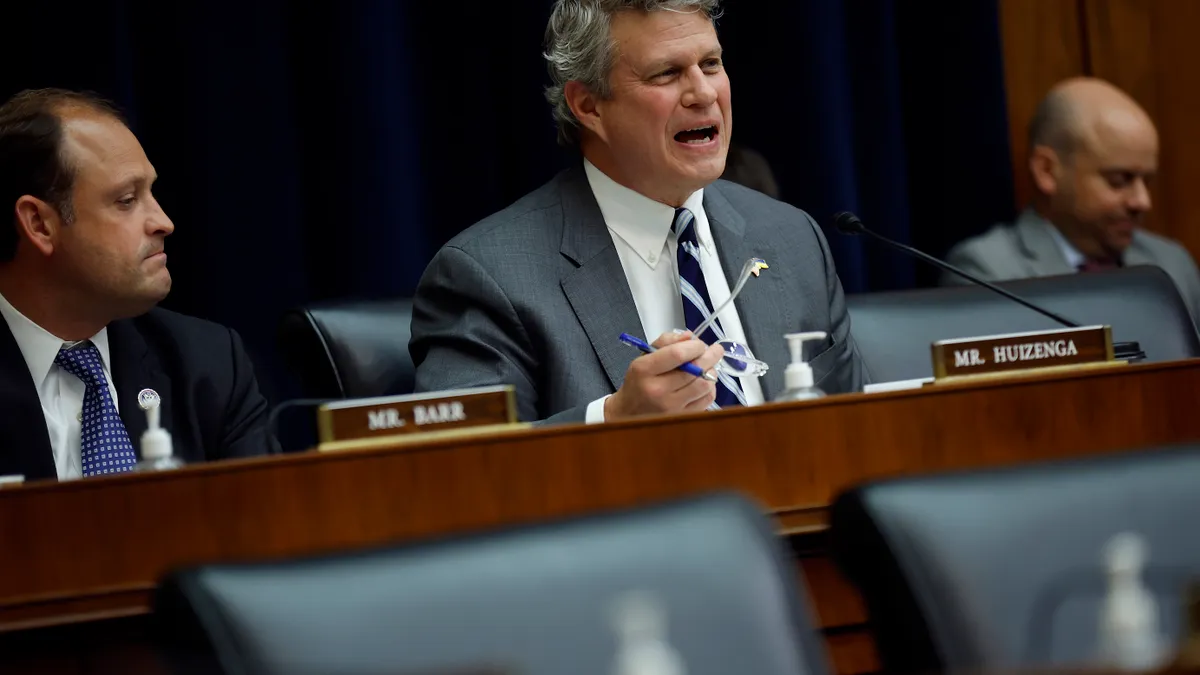Dive Brief:
- A House Financial Services subcommittee held a hearing Tuesday, probing the role of proxy advisors in fund management as part of a broader investigation into ESG practices by House Republicans.
- The Subcommittee on Oversight and Investigations Republicans and the vice president of domestic policy for the National Association of Manufacturers, Charles Crain, used the hearing to decry what they saw as an increased influence of ESG and particularly proxy advisors.
- Subcommittee Chair Bill Huizenga, R-Mich., accused proxy advisors of becoming the “the de facto standard setters for corporate governance policies.” However, Illinois State Treasurer Michael Frerichs said investors use proxy advisors like companies use consultants. He told the committee having the advisors conduct analysis in alignment with individualized fund priorities and guidelines to help investors “sift through mountains of data.”
Dive Insight:
Among the issues, Crain noted Tuesday was the SEC is declining to pursue an appeal after a federal appeals court vacated a 2020 regulation on proxy advisors. The 2020 rule, finalized under the prior administration, interpreted “solicitation” to include proxy advice, which would have required advisors to publicly disclose that advice with the SEC.
The SEC rescinded and amended that rule in 2022, which the Fifth Circuit of Appeals also rescinded, along with vacating and remanding portions of the 2020 guidance in a decision this June. Proxy advisor Institutional Shareholder Services led the fight against the rule, and the National Association of Manufacturers initially stood alongside the SEC in its fight to protect it.
Crain said that if the current ruling is allowed to stand, “the SEC's hands will be tied under any future administration, and proxy firms could remain unregulated in perpetuity.”
Tim Doyle, another panel witness who runs ESG and corporate governance focused Doyle Consulting, said in his opening that the current politicization of ESG is, in part, due to a lack of understanding.
“Banning ESG is an attempt to prevent its use for political or ideological purposes,” Doyle said. “However, this risks excluding otherwise economically relevant data.”
Doyle said ESG factors are neither “always bad” nor “always good” and don’t apply to every investment or business decision, but claiming they’re always bad ignores that ESG factors can be “economically relevant.” He added that, while the term ESG is losing favor due to hyper politicization, “responsible businesses will continue to evaluate non-traditional financial factors to determine their economic relevance.”
Frerichs said he and other large fund managers like him could not do their jobs without the help that proxy advisors provide. He said his office works with proxy advisors, giving advice in accordance with the state funds’ stated priorities, but the advisors are “neutral” in their influence on decisions.
“We would have to hire a lot of people to research and go through the tens of thousands of proxy votes in a year,” Frerichs said Tuesday. “They are our partners in helping us get to that information that we find valuable in making decisions.”
The full committee’s Republican ESG working group released its final report last month, which outlined potential reforms Congress could make to the proxy process, including requiring proxy advisors to register with the Securities and Exchange Commission and higher approval thresholds for resubmittal.
Huizenga, who helped author the ESG working group report, asked Frerichs about what sort of reformed resubmittal thresholds could be appropriate. However, Frerichs pushed back against reforms designed to increase the barriers for shareholders to have their voices heard as “anti Democratic.”
“Just because you have enough shares to file a resolution doesn't mean it will get passed. That's how democracy works,” Frerichs said.
Following the hearing, Rachel Curley, the U.S. Sustainable Investment Forum’s director of policy, said attacks on ESG and sustainable investing “take away investor freedom and restrict the free market.”
“Investors of all kinds … should be free to take into account all financial risks and opportunities that might impact their returns,” Curley said in an emailed release from Petkanas Strategies obtained by ESG Dive.
Kyle Herrig, spokesperson for pro-ESG 501(c4) Unlocking America’s Future, went a step further, calling the hearing an attempt to “fear monger and push misinformation” in a press release Tuesday.
“Huizenga touted fiduciary duty as an argument against ESG, despite the fact that investors have repeatedly made clear that accounting for climate risk is their fiduciary duty,” Herrig said. “The hearing also elevated attacks against shareholders advocating for ESG, but chose to omit the fact that anti-ESG shareholder activists are playing the same game.”












